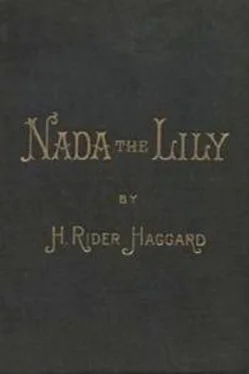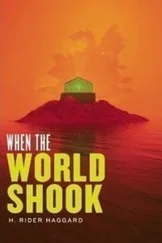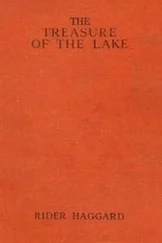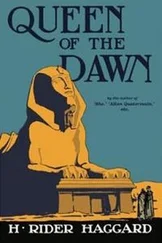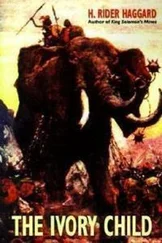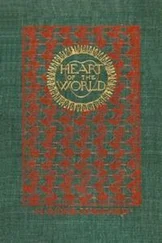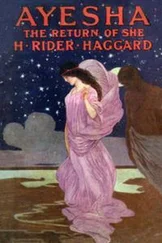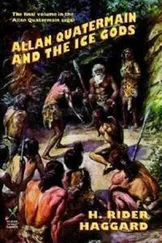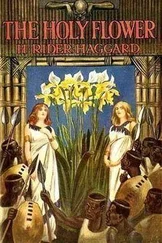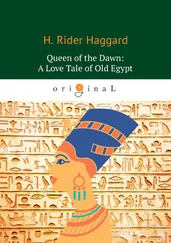"It is hard to die so, Umslopogaas," she answered, "I who am yet young and fair, who love you, and hoped to give you children; but so it has come about, and it may not be put away. I am well–nigh sped, husband; horror and fear have conquered me, my strength fails, but I suffer little. Let us talk no more of death, let us rather speak of our childhood, when we wandered hand in hand; let us talk also of our love, and of the happy hours that we have spent since your great axe rang upon the rock in the Halakazi caves, and my fear told you the secret of my womanhood. See, I thrust my hand through the hole; can you not kiss it, Umslopogaas?"
Now Umslopogaas stooped his shattered head, and kissed the Lily's little hand, then he held it in his own, and so they sat till the end—he without, resting his back against the rock, she within, lying on her side, her arm stretched through the little hole. They spoke of their love, and tried to forget their sorrow in it; he told her also of the fray which had been and how it went.
"Ah!" she said, "that was Zinita's work, Zinita who hated me, and justly. Doubtless she set Dingaan on this path."
"A little while gone," quoth Umslopogaas; "and I hoped that your last breath and mine might pass together, Nada, and that we might go together to seek great Galazi, my brother, where he is. Now I hope that help will find me, and that I may live a little while, because of a certain vengeance which I would wreak."
"Speak not of vengeance, husband," she answered, "I, too, am near to that land where the Slayer and the Slain, the Shedder of Blood and the Avenger of Blood are lost in the same darkness. I would die with love, and love only, in my heart, and your name, and yours only, on my lips, so that if anywhere we live again it shall be ready to spring forth to greet you. Yet, husband, it is in my heart that you will not go with me, but that you shall live on to die the greatest of deaths far away from here, and because of another woman. It seems that, as I lay in the dark of this cave, I saw you, Umslopogaas, a great man, gaunt and grey, stricken to the death, and the axe Groan–maker wavering aloft, and many a man dead upon a white and shimmering way, and about you the fair faces of white women; and you had a hole in your forehead, husband, on the left side."
"That is like to be true, if I live," he answered, "for the bone of my temple is shattered."
Now Nada ceased speaking, and for a long while was silent; Umslopogaas was also silent and torn with pain and sorrow because he must lose the Lily thus, and she must die so wretchedly, for one reason only, that the cast of Faku had robbed him of his strength. Alas! he who had done many deeds might not save her now; he could scarcely hold himself upright against the rock. He thought of it, and the tears flowed down his face and fell on to the hand of the Lily. She felt them fall and spoke.
"Weep not, my husband," she said, "I have been all too ill a wife to you. Do not mourn for me, yet remember that I loved you well." And again she was silent for a long space.
Then she spoke and for the last time of all, and her voice came in a gasping whisper through the hole in the rock:—
"Farewell, Umslopogaas, my husband and my brother, I thank you for your love, Umslopogaas. Ah! I die!"
Umslopogaas could make no answer, only he watched the little hand he held. Twice it opened, twice it closed upon his own, then it opened for the third time, turned grey, quivered, and was still forever!
Now it was at the hour of dawn that Nada died.
Chapter XXXV.
The Vengeance of Mopo and His Fosterling
It chanced that on this day of Nada's death and at that same hour of dawn I, Mopo, came from my mission back to the kraal of the People of the Axe, having succeeded in my end, for that great chief whom I had gone out to visit had hearkened to my words. As the light broke I reached the town, and lo! it was a blackness and a desolation.
"Here is the footmark of Dingaan," I said to myself, and walked to and fro, groaning heavily. Presently I found a knot of men who were of the people that had escaped the slaughter, hiding in the mealie–fields lest the Slayers should return, and from them I drew the story. I listened in silence, for, my father, I was grown old in misfortune; then I asked where were the Slayers of the king? They replied that they did not know; the soldiers had gone up the Ghost Mountain after the Wolf–Brethren and Nada the Lily, and from the forest had come a howling of beasts and sounds of war; then there was silence, and none had been seen to return from the mountain, only all day long the vultures hung over it.
"Let us go up the mountain," I said.
At first they feared, because of the evil name of the place; but in the end they came with me, and we followed on the path of the impi of the Slayers and guessed all that had befallen it. At length we reached the knees of stone, and saw the place of the great fight of the Wolf–Brethren. All those who had taken part in that fight were now but bones, because the vultures had picked them every one, except Galazi, for on the breast of Galazi lay the old wolf Deathgrip, that was yet alive. I drew near the body, and the great wolf struggled to his feet and ran at me with bristling hair and open jaws, from which no sound came. Then, being spent, he rolled over dead.
Now I looked round seeking the axe Groan–Maker among the bones of the slain, and did not find it and the hope came into my heart that Umslopogaas had escaped the slaughter. Then we went on in silence to where I knew the cave must be, and there by its mouth lay the body of a man. I ran to it—it was Umslopogaas, wasted with hunger, and in his temple was a great wound and on his breast and limbs were many other wounds. Moreover, in his hand he held another hand—a dead hand, that was thrust through a hole in the rock. I knew its shape well—it was the little hand of my child, Nada the Lily.
Now I understood, and, bending down, I felt the heart of Umslopogaas, and laid the down of an eagle upon his lips. His heart still stirred and the down was lifted gently.
I bade those with me drag the stone, and they did so with toil. Now the light flowed into the cave, and by it we saw the shape of Nada my daughter. She was somewhat wasted, but still very beautiful in her death. I felt her heart also: it was still, and her breast grew cold.
Then I spoke: "The dead to the dead. Let us tend the living."
So we bore in Umslopogaas, and I caused broth to be made and poured it down his throat; also I cleansed his great wound and bound healing herbs upon it, plying all my skill. Well I knew the arts of healing, my father; I who was the first of the izinyanga of medicine, and, had it not been for my craft, Umslopogaas had never lived, for he was very near his end. Still, there where he had once been nursed by Galazi the Wolf, I brought him back to life. It was three days till he spoke, and, before his sense returned to him, I caused a great hole to be dug in the floor of the cave. And there, in the hole, I buried Nada my daughter, and we heaped lily blooms upon her to keep the earth from her, and then closed in her grave, for I was not minded that Umslopogaas should look upon her dead, lest he also should die from the sight, and because of his desire to follow her. Also I buried Galazi the Wolf in the cave, and set the Watcher in his hand, and there they both sleep who are friends at last, the Lily and the Wolf together. Ah! when shall there be such another man and such another maid?
At length on the third day Umslopogaas spoke, asking for Nada. I pointed to the earth, and he remembered and understood. Thereafter the strength of Umslopogaas gathered on him slowly, and the hole in his skull skinned over. But now his hair was grizzled, and he scarcely smiled again, but grew even more grim and stern than he had been before.
Читать дальше
